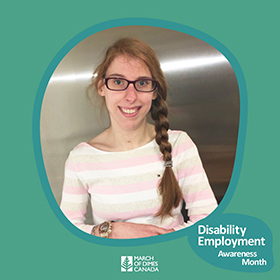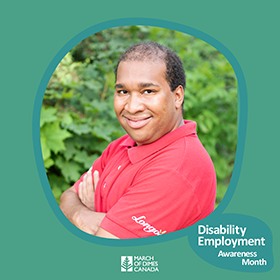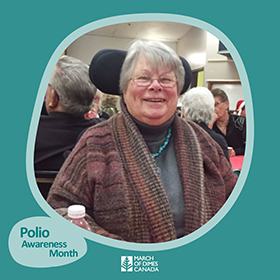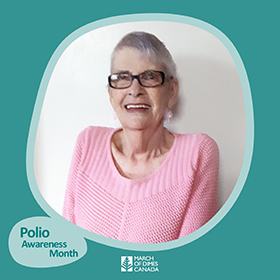October 01, 2020
October brings cooler weather, changing leaves, and awareness - welcome to Polio Awareness Month and Disability Employment Awareness Month! This is a special month for us at March of Dimes Canada because we support polio survivors and job-seekers with disabilities.
Each Monday in October, we’ll be sharing the stories of polio survivors and clients that were supported by our Employment Services staff.
We wanted our clients to tell their stories show the different ways that March of Dimes Canada supports people living with disabilities. Who knows? You or someone you know may benefit from our one of our programs!
Disability Employment Awareness Month
March of Dimes Canada’s Employment Services exists to support people with disabilities while they look for and find meaningful jobs. During these challenging times, we’re continuing to help clients find jobs at retail stores, federal government ministries, corporations, care facilities and more. The benefits of inclusive employment are catching on!
 Meet Taylor Isaac
Meet Taylor Isaac
Taylor Isaac believes in herself. “We all have talents we want to use,” she says. “And we should all have that chance.”
Taylor spent a lot of time trying to find a job where she could use her talents. She volunteered at various places, was active in her community, and sought out employment support at a few different organizations. She turned to March of Dimes Canada’s Employment Services, after participating in our youth program in Mississauga.
Taylor was assigned a caseworker who supported her by finding suitable job postings and going with her to meet potential employers. Everything fell into place when March of Dimes Canada partnered with Amazon Canada on its Alternative Workforce Supplier Program.
“My caseworker said, ‘Let’s give it a try,’ and I thought, great!” Taylor remembers.
It turned out to be a fantastic idea. Taylor was able to try out different positions at Amazon until she found one that worked for her – checking returned items to make sure they were re-sellable and sorting them.
She was also able to customize the position to her unique needs. Using box-cutters was physically challenging, for instance, so she was assigned smaller, lighter parcels that she could open by hand.
Taylor’s caseworker checked in a few times to make sure she had everything she needed to succeed.
“I knew I could meet the requirements if I was given the opportunity. It takes a while for my brain to process lots of new information at once, and at Amazon they gave me the time and training to find an area where I’d be successful.”
“I finally found a company that accepts me,” Taylor adds.
Congratulations, Taylor! We look forward to hearing about more of your successes in the future!
 Meet Quincy Odutayo
Meet Quincy Odutayo
Like many people living with disability, Quincy Odutayo had trouble finding work. “It was difficult,” he says. “I get nervous in interviews, and a lot of people thought I wouldn’t be a good employee.”
Fortunately, someone told him about March of Dimes Canada’s Employment Services. Quincy reached out and found the support he needed. “First, we talked about what kind of jobs I would like and my experience. Then, we worked on my resume and practised interview questions,” he says. With help, he did the work to prepare himself, overcame his nervousness and was successfully placed in a job as a buggies attendant at a local Longo’s supermarket, which Quincy has had for a year now. “I was a little shy, the first day, because I didn’t know a lot of people, and I had to learn the job,” he says. “But now I’m good at it.”
It’s worked out well. Quincy is proud of his accomplishments and he’s well-liked at Longo’s, giving him the social connection and confidence that he was looking for. “I want to take on more responsibility. Do more. Have more experiences on the job,” he adds. “This will be good for my future.”
Polio Awareness Month
March of Dimes Canada started in 1951 as a group of mothers banding together to fight polio. Since then, we’ve worked to eradicate the disease in Canada and support polio survivors across the country through Post-Polio Canada.
To celebrate Polio Awareness Month during COVID-19, we’ll bring you the stories of two polio survivors who have a unique perspective on the first pandemic they survived and the one they’re living through now.
Post-Polio Canada Resource Directory
We are also know that Polio survivors who live with post-polio syndrome often have trouble finding others who understand what they’re going through emotionally and physically. That’s why we’ve put together a Post-Polio Canada Resource Directory. The directory includes resources, support groups, and medical professionals who are familiar with post-polio syndrome.
Click here to view the directory.
 Meet Elizabeth Lounsbury
Meet Elizabeth Lounsbury
To this day, Elizabeth Lounsbury still can’t go near a drinking fountain.
“We used to think polio could be found on the fountains. It could be anywhere. Back then, we thought polio was a hidden monster waiting to jump out and grab you.”
Elizabeth was only eight years old when she first came down with polio. She still remembers childhood during that chaotic time. “The movie theatres were shut down. Swimming pools were shut down. We weren’t allowed to play in playgrounds, or with other children. It was exactly like the current pandemic actually,” Elizabeth recalls. “In fact, my grandson recently asked me why we need to wear our masks and if the COVID monster will get us anyway. I told him if I had listened to my mum about staying safe back then, I wouldn’t be in a wheelchair now. I think that worked,” Elizabeth says with a wry smile.
The parallels between COVID-19 and polio are staggering. Polio epidemics hit Canada in waves from the 1920s to the 1950s, killing thousands and crippling tens of thousands more, especially during what Elizabeth calls ‘polio season’. At the time, people weren’t sure what caused the disease and lock down measures were put in place for children, as they are today for most adults.
For Elizabeth, her childhood polio was only the start of her challenges. Decades later, at age 35, a host of new symptoms began to flare up, leaving her feeling weakened, in pain, and shivering from extreme cold. “My doctor’s thought it was all in my head. They just didn’t believe me. It wasn’t until March of Dimes Canada helped me discover post-polio that I found the support and understanding I needed.”
To this day, many polio survivors still don’t realize they’re living through the symptoms of post-polio. They live in pain, suffering depression, and possibly even contemplating suicide. But Elizabeth says March of Dimes Canada has given her a crucial understanding of her condition, changing the minds of her doubting doctors and even helping her find post-polio support groups to make her feel less alone.
“So many people don’t connect these problems to polio. It’s simple. If you’ve had polio, make sure your doctor knows. And if they don’t know about post-polio, get some information from March of Dimes Canada. You don’t have to suffer alone.”
 Meet Miki Boleen
Meet Miki Boleen
Miki Boleen was only 8 years old when she was first struck down by Polio. Then, in 1953, at age 14, she had a second, even more severe episode.
That second time “was a whole different story”, says Miki. “I was a normal young girl. I’d only just started high school. And in one day I went from feeling fine in class to heading home with a severe headache. By morning, I couldn’t walk.”
Miki was rushed across the province to a polio hospital in Winnipeg, Manitoba where she would spend the next 9 months. “No one spoke to me in the ambulance on the way there. I was so scared. I thought I had died”.
When she arrived, the whole hospital was under quarantine. Governments had pulled nursing students out of school to work the floors due to a lack of staff. Hospital beds were packed tightly together just to fit all the patients. It was chaos.
The nurses would boil old woolen army blankets, and tightly wrap up patients in them, like mummies, packing them in like sardines. “I still can’t stand the smell of wet wool”, remembers Miki.
The scariest part for her was seeing other young patients being removed in the middle of the night. “They’d give us some excuse, but I was old enough to know what had happened.”, says Miki. “I’m not sure how long those nightly deaths went on for, or how many I saw, but it’s something I’ll never forget.”
At the time, it was assumed that only children were infected. But when Miki was moved to a rehab hospital, there were many older people suffering too. “Just like people assumed Covid could only affect the elderly, now we’re seeing younger and younger people suffering and dying.”, says Miki, now 80 years young.
“We have to be patient. We have to listen to the doctors. If you can protect yourself and others, just by wearing a mask? For goodness sake, make it a fashion accessory. You have no idea.”
